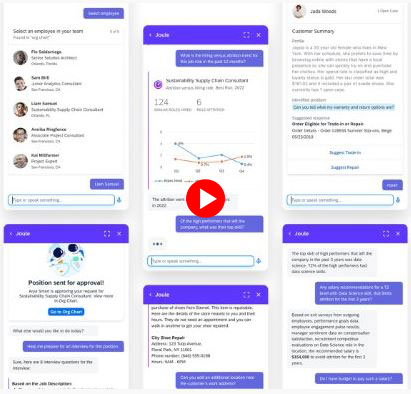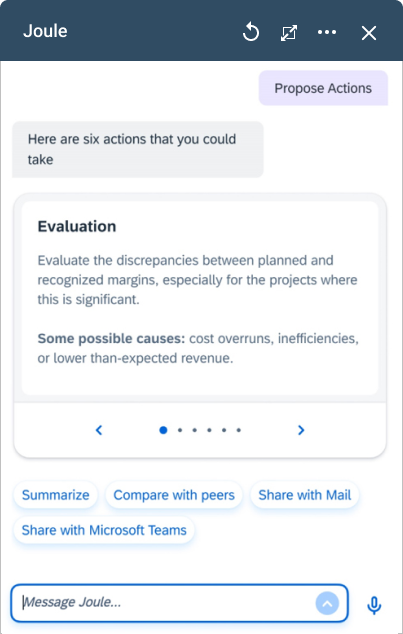Specific Conditions AI - Resource Center
the Learning Center will provide users with a robust platform to master SAP Joule 2024 and apply its capabilities to real-world business challenges.

Key Features of SAP Joule:
SAP Joule is an advanced, AI-powered solution designed to enhance organizational decision-making through intelligent insights, predictive analytics, and machine learning. By leveraging large datasets and sophisticated algorithms, SAP Joule helps businesses uncover patterns, forecast outcomes, and automate routine tasks, making operations more efficient and strategic.

Modules and Features: SAP Joule
SAP Joule is a comprehensive AI-driven platform designed to revolutionize business operations through its diverse modules and features. Each module is tailored to address specific organizational needs, from strategic decision-making to operational efficiency. Here's a detailed description of its key modules and features:

Data-Driven Decision Making with SAP Joule
Data-Driven Decision Making is one of the core functionalities of SAP Joule, enabling organizations to make informed, strategic choices based on real-time data and predictive analytics. By analyzing current trends, historical data, and future projections, this feature helps businesses optimize their operations and stay ahead of the competition.

Integrated Platform
The Integrated Platform for Business Applications is a standout feature of SAP Joule, designed to create a seamless connection between various business processes and systems within an organization. By integrating with other SAP solutions and third-party applications, SAP Joule provides a unified platform that ensures data consistency and holistic insights across all business functions.

1. SAP Business Technology Platform (BTP)
Overview: SAP BTP integrates data management, analytics, application development, and AI capabilities into a unified platform.
Features:
- Data Integration: Seamlessly connect data from various sources for a holistic view.
- AI and Machine Learning: Leverage pre-built AI models and tools to enhance business processes.
- Analytics: Real-time analytics capabilities for informed decision-making.
Use Cases: Businesses can use BTP to build custom applications, automate workflows, and enhance existing SAP solutions with AI insights.
- Analyze supplier data, including financial health, past performance, and external risk factors.
- Use AI-driven insights to flag high-risk suppliers and recommend alternatives.
- Continuously update risk profiles based on new data and market conditions.
2. Spend Analysis
Use Case: Gain better visibility into spending patterns to identify cost-saving opportunities.
SAP AI Service: SAP Analytics Cloud and SAP Ariba Spend Analysis
Implementation- Aggregate spend data from multiple sources across the organization.
- Use AI to categorize expenses, detect anomalies, and identify maverick spending.
- Develop data-driven procurement strategies to optimize budgets.
3. SAP Conversational AI
Overview: A platform designed for building and deploying intelligent chatbots.
Features:
- Natural Language Understanding: Understand and process user inputs in natural language.
- Integration: Connects easily with SAP and non-SAP applications.
- Analytics Dashboard: Provides insights into bot performance and user interactions.
Use Cases: Businesses can deploy chatbots for customer service, internal support, or sales inquiries, enhancing user engagement and reducing response times.
4. SAP Predictive Analytics
Overview: A solution that enables organizations to gain insights from historical data and predict future trends.
Features:
- Automated Machine Learning: Simplifies the model-building process with automated tools.
- Visualization Tools: Provides visualizations to help interpret data insights effectively.
- Integration with SAP Solutions: Enhances existing SAP applications with predictive capabilities.
Use Cases: Companies can use predictive analytics for sales forecasting, risk assessment, and demand planning.
5. SAP Analytics Cloud
Overview: A comprehensive cloud solution that combines business intelligence, planning, and predictive analytics.
Features:
- Data Connectivity: Connects to various data sources for comprehensive analysis.
- Collaboration Tools: Allows teams to work together on insights and planning.
- Smart Insights: AI-driven recommendations and insights based on data analysis.
Use Cases: Organizations can utilize it for financial planning, operational reporting, and strategic decision-making.
6. SAP Intelligent Robotic Process Automation (RPA)
Overview: A solution to automate repetitive tasks through bots, improving efficiency and accuracy.
Features:
- Low-Code Development: Users can create bots with minimal coding knowledge.
- Integration: Works with both SAP and third-party applications.
- Monitoring and Analytics: Track bot performance and identify improvement areas.
Use Cases: Businesses can automate data entry, invoice processing, and report generation, freeing up staff for higher-value tasks.
7. SAP Customer Experience Solutions (CX)
Overview: AI-enhanced tools designed to improve customer interactions and personalization.
Features:
- Personalized Recommendations: AI-driven product recommendations based on customer behavior.
- Customer Insights: Analyze customer data to tailor marketing strategies.
- Omni-channel Engagement: Manage customer interactions across various channels seamlessly.
Use Cases: Retailers can enhance online shopping experiences, while service providers can improve customer support through personalized interactions.
8. SAP Success Factors
Overview: A cloud-based human capital management suite with integrated AI capabilities.
Features:
- Predictive Analytics for HR: Anticipate employee turnover and performance issues.
- Personalized Learning: AI-driven learning paths tailored to individual employee needs.
- Recruitment Automation: Streamlines the hiring process through intelligent screening.
Use Cases: Organizations can optimize talent acquisition, enhance employee engagement, and improve workforce planning.
9. SAP Field Service Management
Overview: A solution to optimize field service operations using AI.
Features:
- Predictive Maintenance: Use AI to anticipate equipment failures and schedule maintenance.
- Dynamic Scheduling: Optimize technician assignments based on real-time data.
- Mobile Capabilities: Empower field technicians with mobile access to data and tools.
Use Cases: Companies can enhance service delivery, reduce downtime, and improve customer satisfaction through efficient field service management.
These SAP AI products are designed to drive innovation, efficiency, and customer engagement across various business functions. By leveraging these tools, organizations can harness the power of AI to enhance their operations and achieve strategic goals. Let Specific Conditions help you implement these SAP AI products across your eneterprise.
